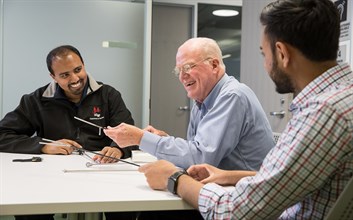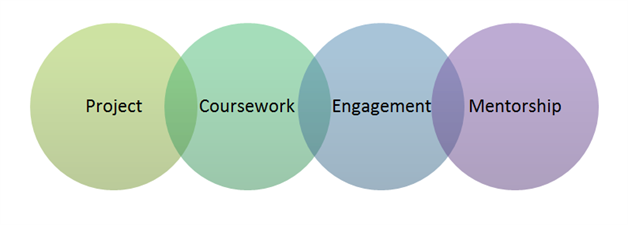For residents interested in medical technology and surgical innovation, the Biodevice Innovation Pathway provides rigorous hands-on research experiences developing and translating novel medical devices and technologies for unmet clinical needs alongside surgical innovators, bioengineering faculty and graduate students, and device industry professionals.
Projects are selected from among various device development efforts underway in the Surgical Innovations program and in the laboratories of the pathway mentors, which include new devices and treatment approaches for sleep apnea, decubitus ulcers, kidney disease, diabetes, incisional hernias, and tissue retraction. This pathway will provide residents with an in-depth understanding of the technical, regulatory, and business realities involved in bringing novel medical technologies to the market while providing experiential learning in device design, animal model development, clinical trials, and startup formation.
The UCSF Biodevice Innovation Pathway is committed to enhancing the diversity of the surgical workforce and strives to provide a supportive and inclusive training experience. Applications from underrepresented minorities, women, and trainees with disabilities are especially encouraged. This pathway will provide residents with an in-depth understanding of the technical, regulatory, and business realities involved in bringing novel medical technologies to the market while providing experiential learning in device design, animal model development, clinical trials, and startup formation.
Eligibility: Surgery residents or residents from other surgical disciplines from UCSF or outside universities with one to two years to devote full-time to research.
Application process:
- Complete our brief interest form.
- Submit the following documents electronically in Microsoft Word or PDF format to Usha Thekkedath ([email protected])
- Curriculum Vitae
- Personal Statement: A 1-2 page statement on your background, research interests as they relate to the Biodevice Innovation Pathway, and future career goals. If you would like to work on a specific research project, indicate which one and explain.
- References: Contact information for two professional references.
After the application period, top candidates will be invited for an in-person or virtual interview.
Deadlines:
Priority: December 15, 2021
Final: January 10, 2022
Biodevice Innovation Pathway Team
Faculty Leadership
- Hanmin Lee, MD – Pediatric Surgery
- Shuvo Roy, PhD – Bioengineering & Therapeutic Sciences
Faculty Mentors

- Edward Chang, MD – Neurological Surgery
- Michael Conte, MD – Vascular & Endovascular Surgery
- Tejal Desai, PhD – Bioengineering & Therapeutic Sciences
- Emily Finlayson, MD – General Surgery
- Julius Guccione, PhD – Cardiothoracic Surgery & Bioengineering
- Hobart Harris, MD, MPH – General Surgery
- Michael Harrison, MD – Pediatric Surgery
- Steven Hetts, MD – Interventional Radiology
- Hanmin Lee, MD – Pediatric Surgery
- Jeffrey Lotz, PhD – Orthopaedic Surgery
- Theodore Miclau, MD – Orthopaedic Surgery
- Shuvo Roy, PhD – Bioengineering & Therapeutic Sciences
- Marshall Stoller, MD – Urology
- Qizhi Tang, PhD – Transplant Surgery
- Valerie Weaver, PhD – Surgery & Bioengineering
Biodevice Fellows
Coursework
Innovation Pathway residents will receive core didactic training on topics relevant to translational medicine and medical device development, including scientific writing, clinical trial design, intellectual property, regulatory and reimbursement considerations, cost-effectiveness analysis, and entrepreneurship. Pathway residents are typically expected to take one class per quarter, to be chosen in consultation with the Pathway Directors based on the nature and goals of the resident’s project and the resident’s interests.
General Research Courses
- EPI 150.03 – Designing Clinical Research
- Department of Surgery Scientific Writing Course
- BMS 214 – Ethics and Responsible Conduct of Research
- BIOSTAT 200 – Biostatistical Methods in Clinical Research
- EPI 212 – Publishing Medical Research
- CTSI Grant Writing Workshop
Bioengineering Courses
- Software/specialized training as required by project (e.g., Intro to ANSYS, SolidWorks, etc.)
- BIOE 270 – Translational Challenges: Diagnostics, Devices & Therapeutics
Entrepreneurship Courses
Learning Objectives
- Establish and maintain first-hand knowledge of the device development process and related topics such as intellectual property, quality systems, and regulatory, reimbursement, and business considerations.
- Gain fluency in foundational clinical and translational research skills such as experimental design, biostatistics, research ethics, and grantsmanship
- Apply basic prototyping skills (CAD modeling, 3D printing, etc.) and demonstrate an appreciation for bioengineering processes.
- Develop and troubleshoot animal models of surgical diseases.
- Develop a business plan and pitch to investors.
- Develop leadership and communication skills and work effectively in multidisciplinary teams.
Pathway Requirements

- Completion of primary project
- General milestones
- Year 1: Presentation at major engineering conference; grant submission
- Year 2: Manuscript preparation and submission; presentation at major surgical conference
- Exact milestones/goals identified with mentor depending on project specifics
- Completion of pathway coursework
- Twice-weekly Innovators Meetings attendance
- Regularly scheduled meetings with faculty mentor
- Other Surgical Innovations meetings and events
Advanced Degree Option
The Master of Translational Medicine (MTM) program is a professional master's program run jointly between the College of Engineering at UC Berkeley and the Schools of Medicine and Pharmacy at UC San Francisco. The program is 11 months long (August-June), and is well-suited for scientists, engineers, and clinicians who have a strong interest in medical technology innovation, including medical devices, new drug development, technical design, and the business and regulatory aspects of the med-tech and healthcare industries. Graduates of the program receive a unique Master of Translational Medicine degree from two world-class institutions. More information is available at http://bioeng.berkeley.edu/mtm. Interested applicants may contact the UCSF MTM Faculty Director, Shuvo Roy, PhD, at [email protected] with specific questions.
Funding Opportunities
Biodevice Innovation Fellowship - NIH R25
Up to two sponsored fellowship slots per year are offered to exceptional residents interested in pursuing innovation-related research and training during their research years. The program is funded by a NIH R25 training grant and the Department of Surgery.
Open Grant-Funded Positions
Faculty mentors participating in this pathway may have grant funding to support a research resident. Such opportunities will be listed here as they arise.
- Project: Magnetic Duodeno-Ileal Bypass for Metabolic Syndrome in Rhesus Monkeys
Mentor: Michael Harrison, MD
Funding Source: NIDDK SBIR 1 R44 DK112453-01
Key Tasks: In vivo studies, surgical technique development, histologic analysis
Collaborating Institutions: UC Davis, Columbia University
Description: Type 2 diabetes mellitus (T2DM) associated with obesity can now be successfully treated by bariatric surgery. The metabolic effect is rapid – in part independent of the effect on weight loss – and mediated by gut factors. We are exploring the possibility that this beneficial effect on T2DM can be achieved without major surgery by creating a small side-to-side magnetic compression anastomosis between the duodenum and the ileum (Magnetic Duodenal-Ileal Bypass, or “DIPASS”). Our preliminary data in mini-pigs suggest that, by diverting a small amount of digestive juices (gastric, biliary, pancreatic) to the ileal mucosa, this intestinal short cut is able to mimic the beneficial metabolic and hormonal effect of bypass surgeries on glucose metabolism. This proposal will test: 1) the feasibility of inserting the intestinal short cut (DIPASS) in a non-human primate model of metabolic syndrome; 2) the efficacy of the DIPASS procedure, versus sham operation, on improving metabolism; and 3) the mechanism by which DIPASS exerts its effect on glucose metabolism.
- Project: Bioinspired Polymers for Fetal Membrane Pre-Sealing
Mentor: Michael Harrison, MD
Funding Source: NIBIB 1 R01 EB022031-01 (UC Berkeley prime)
Key Tasks: In vivo studies, benchtop testing, tissue analysis, delivery technique development
Collaborating Institutions: UC Berkeley, Caltech
Description: The goal of the project is the development and testing of a bio-adhesive for sealing the amniotic membrane after fetal intervention. The synthesis of the bio-adhesive will be done in Dr. Phil Messersmith’s laboratory at University of California, Berkeley. To test the utility of the bio-adhesive for sealing the amniotic membrane, bench top and animal studies will be performed at UCSF. The bench top studies will be performed on human fetal membranes procured from the UCSF maternity ward. Burst pressure tests will be performed to test the effectiveness of the bio-adhesive in sealing the membrane. A rabbit animal model will be employed to test the efficacy of pre-sealing fetal membranes with the bioinspired sealants in vivo. Primary outcome measures will include fetal survival rates and amniotic fluid leakage.
- Project: The Kidney Project
Mentor: Shuvo Roy, PhD
Description: The Biodesign Laboratory at UCSF, led by Dr. Shuvo Roy, is seeking highly motivated postdoctoral fellows to work on The Kidney Project, a multidisciplinary team of academic and industry researchers who are applying MEMS (microelectromechanical systems) and tissue engineering strategies to create a surgically implantable bioartificial kidney for end-stage renal disease patients. The prospective post-docs will contribute to developing an implantable device suitable for preclinical testing in collaboration with nephrologists, biomedical engineers, and transplant surgeys. The Biodesign Lab is looking for multiple new post-docs in the following research areas: - Microfabrication: Design and fabrication of robust silicon membranes with sub- 10nm pores for blood filtration and cell immunoisolation. Prior experience with stepper lithography, deep reactive ion etching (DRIE) and surface analysis tools is highly desirable.
- Cell Culture & Biomaterials: Cell biology, and tissue engineering. Prior experience with islet biology, renal epithelial cell biology, cell culture techniques, tissue engineering, biomaterials, medical device development and biomedical engineering related to mass transport mathematical mdoeling is highly desirable.
- Mechanical Design: Assembly and packaging of silicon components into biocompatible packages for implanted operation. Prior hands-on experience with construction and testing of MEMs devices desirable. Prior experience with machining tools, device fabrication, and biocompatible packaging is highly desirable.
- Microfluidics: Participate in conceptual design, detailed design document, rapid prototyping, assembling and testing of blood flow path components in medical devices. Direct experience with SolidWorks and ANSYS highly desirable
- Project: SmartDerm
Mentor: Hanmin Lee, MD - Description: Pressure ulcers, or bedsores, are a serious medical condition that occurs in 2.5 million patients annually, resulting in 60,000 deaths and a $13 billion burden to the U.S healthcare system. These sores form from pressure accumulation on bony prominences (e.g. sacrum, heels) in immobile patients leading to tissue injury, and can take months to years to heal. To address this issue, SmartDerm proposes a comprehensive pressure ulcer prevention system consisting of intelligent sensor patches that continuously collect data across multiple modalities such as pressure and oxygenation, from which machine learning algorithms predict the likelihood of ulcer formation. This information is analyzed and presented to nurses to streamline their workflow and enable data-driven intervention efforts. Eventually, this data will be used to actuate a localized, wearable automated repositioning device that continuously prevents ischemia by redistributing pressure from high risk areas, thus creating a "bundle solution" that can run in the background at hospitals, actively preventing ulcers
- For the general list of fellowships and other grant opportunities for the resident research program, click here.